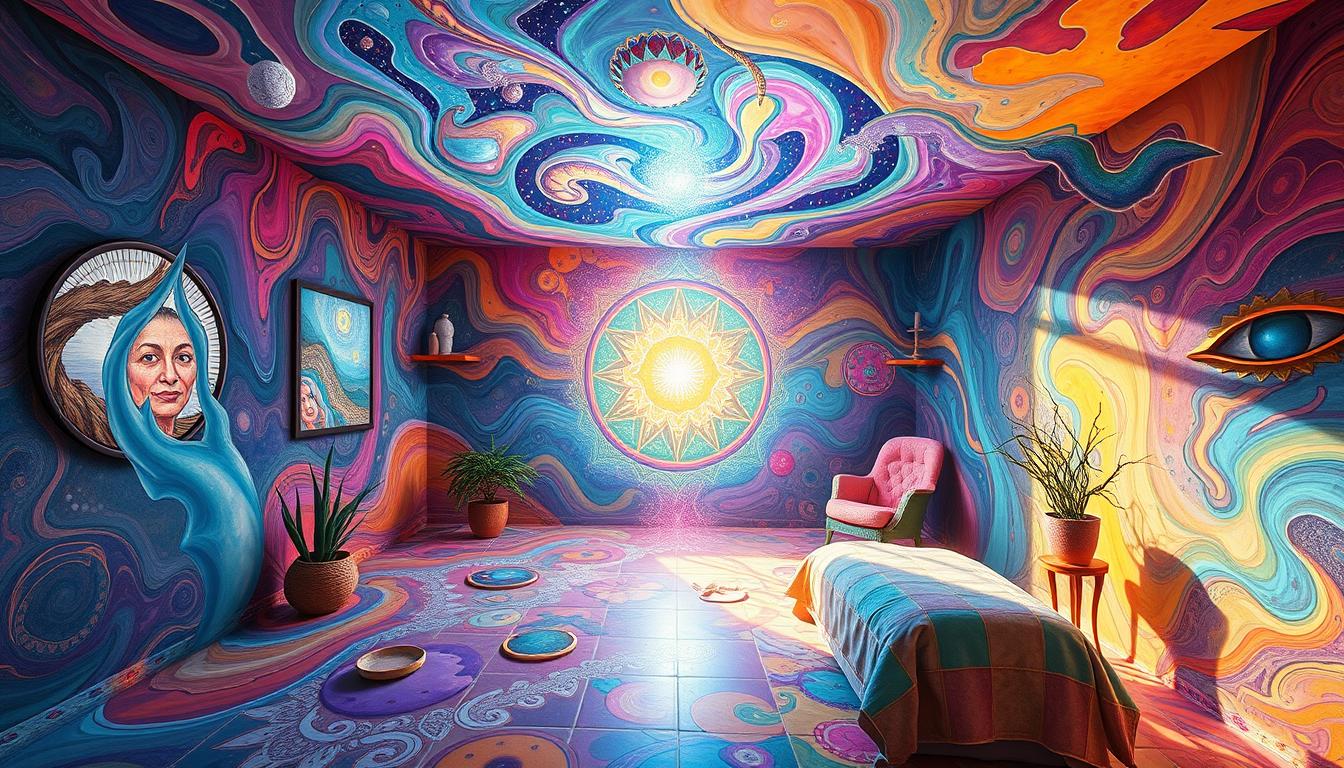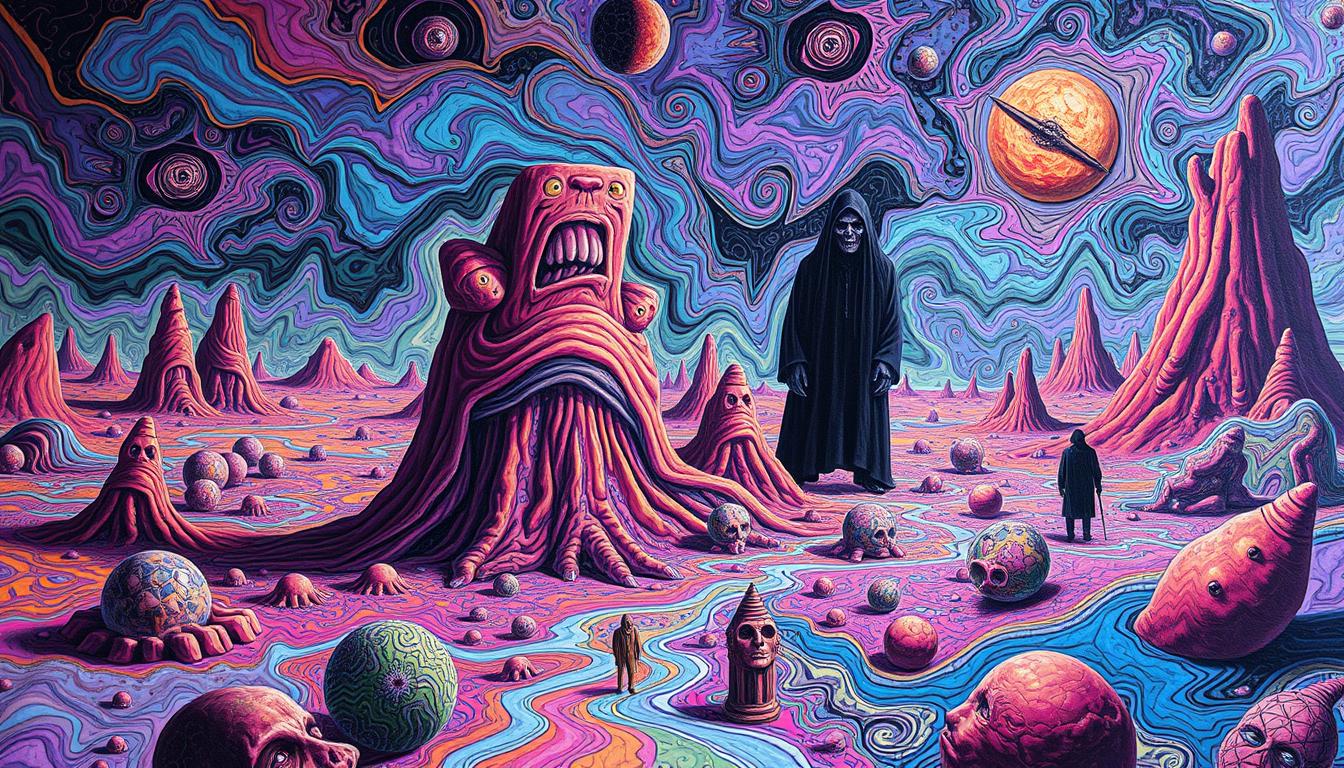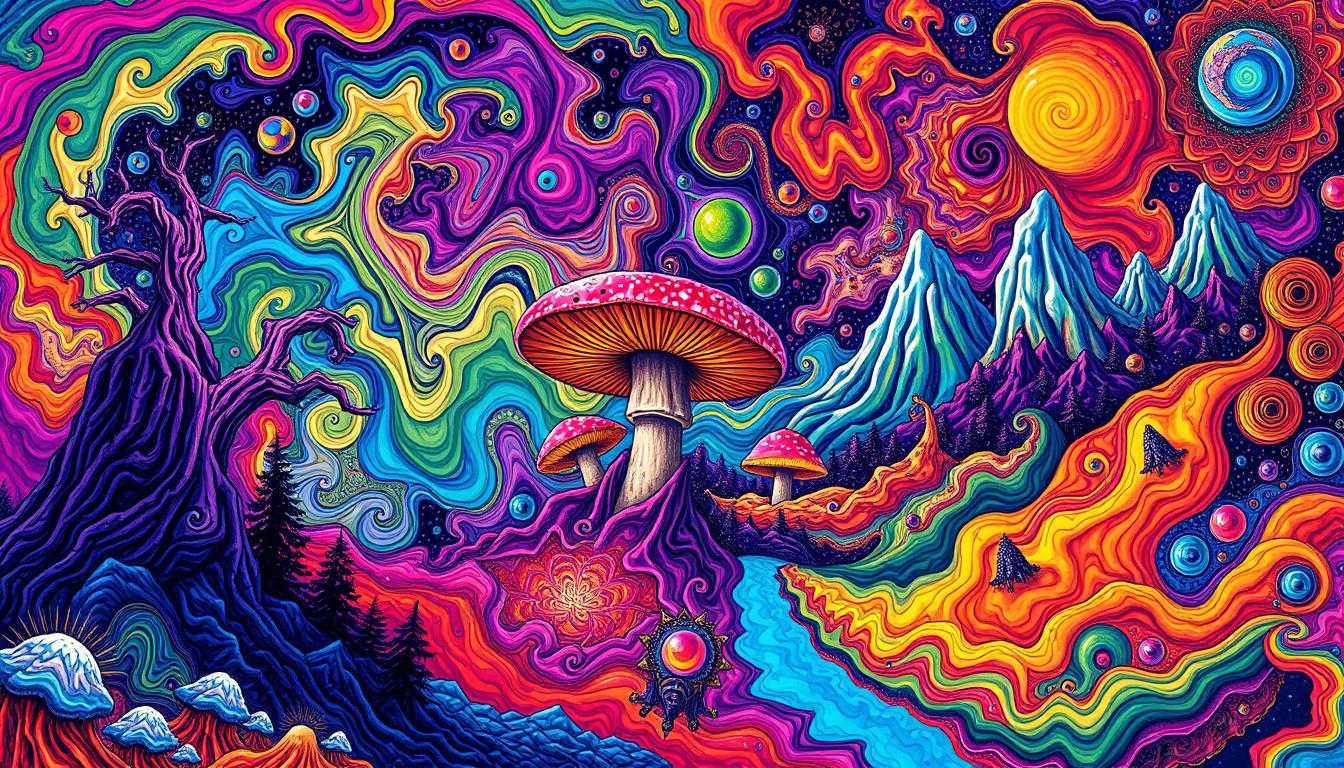Articles
DMT for Mental Health Therapy in Canada: Current Status
The world of mental health treatment is changing fast. People are now looking into psychedelic-assisted psychotherapy in Canada. N,N-Dimethyltryptamine (DMT) is a key player in this area. It’s found in plants and in our bodies. The big question is, can DMT help us heal and grow?
The Government of Canada is putting money into studying psychedelic therapy. This includes DMT. In Alberta, a new program lets people try psychedelics like DMT for mental health issues. This is a big step towards finding new ways to treat depression, anxiety, and trauma.
Key Takeaways
- The Government of Canada is actively investing in research on psychedelic-assisted psychotherapy, including the use of DMT.
- Alberta has taken a progressive step by regulating psychedelic drugs for mental illness treatment, providing new options for patients.
- A special access program in Canada allows individuals to request the use of psychedelics, including DMT, for therapeutic purposes under medical supervision.
- The growing interest in DMT therapy reflects a shift in the public perception and acceptance of psychedelics as mental health treatments.
- Canada has the opportunity to lead in the psychedelic renaissance, but it raises important questions about regulation, administration, and the inclusion of Indigenous knowledge in health systems.
Understanding DMT and Its Effects
DMT, or dimethyltryptamine, is a powerful psychedelic found in plants and the human body. It causes deep, mind-changing experiences and vivid hallucinations. These are often more intense than those from LSD or psilocybin. DMT changes how we see and think by altering brain chemistry.
What is DMT?
DMT is a psychoactive compound found in plants like ayahuasca. It’s a tryptamine, like serotonin and melatonin. For centuries, it’s been used in spiritual and shamanic practices in South America.
How Does DMT Work?
DMT interacts with the serotonin 2A receptor in the brain. This receptor controls perception, mood, and thinking. When DMT binds to it, it changes brain activity, leading to a psychedelic experience. This includes vivid hallucinations and a sense of deep connection.
The Experience of Using DMT
“The DMT experience is often described as a profound, mind-bending journey into the depths of consciousness. Users report encountering otherworldly entities, visiting fantastical realms, and experiencing a profound sense of spiritual connection and insight.”
DMT’s effects are quick and strong, lasting 15-30 minutes when smoked. But, it can last hours in ayahuasca. The experience is filled with fast visual and auditory hallucinations and a shift in perception.
The Growing Interest in Psychedelics for Therapy
Recently, there’s been a big surge in using psychedelics for mental health. This is thanks to a long history of research. In the 1950s and 1960s, Canadian psychiatrists started exploring psychedelics. They even coined the term “psychedelic” and looked into LSD’s benefits for alcoholism.
Today, studies show psychedelics like psilocybin and MDMA are helping in therapy. They’re being used to treat anxiety in people with terminal illnesses, alcohol dependence, and other mental health issues. This research has changed how people see psychedelics. Now, more people see their value in mental health treatment and alternative therapies.
“Preliminary evidence indicates that psychedelics, when used with psychotherapy, can help with certain mental health and substance use challenges.”
As research and interest in psychedelic therapy grow, the future looks bright. Psychedelics could soon become a key part of mental health treatment in Canada.
Current Legal Status of DMT in Canada
In Canada, the laws about DMT, a strong psychedelic, are changing. DMT is listed as a Schedule III substance under the Controlled Drugs and Substances Act (CDSA). This act controls the use, sale, and possession of psychoactive drugs. But, new rules are making it easier to legally use DMT for health reasons.
Federal Regulations and Policies
The CDSA usually bans DMT use without a special permit. But, the government has made it easier to use DMT for research and medicine. The Section 56 exemptions let doctors, pharmacists, and licensed sellers use DMT for medical needs. This has allowed for clinical trials and specialized clinics to offer DMT therapy under strict rules.
Provincial Variations
Canada’s laws on DMT and other psychedelics also vary by province. Alberta was the first to allow the medicinal use of psychedelics. It set rules for healthcare providers and places where psychedelic therapy is given. This could inspire other provinces to follow, making DMT therapy more available for mental health.
Future Legal Considerations
As scientists learn more about DMT’s benefits, there’s a push to relax laws and maybe even decriminalize some psychedelics in Canada.
“The chance for legal psychedelic therapy in Canada is growing. Clinical trials and Section 56 Exemptions give patients legal ways to get psychedelic treatments.”
The future of DMT laws in Canada is uncertain. But, the laws are likely to change as attitudes and research on psychedelics in mental health therapy evolve.
Research Initiatives on DMT and Mental Health
The field of psychedelic-assisted psychotherapy is growing fast. There’s a lot of DMT research looking into how it can help with mental health. In Canada, researchers are running clinical trials and mental health studies to learn more about DMT’s effects.
Key Studies and Findings
Early results from clinical trials are looking good. They show DMT might help with depression, anxiety, and PTSD. Scientists are studying how DMT changes the brain and helps with emotions. This gives hope to those dealing with these tough mental health issues.
Institutions Conducting Research
Top Canadian universities and research centers are leading the DMT research. They work with experts in psychiatry, neuroscience, and psychology. Their goal is to learn more about DMT’s healing powers.
Participant Experiences
People who’ve tried DMT-assisted therapy have shared their stories. These stories give researchers a glimpse into how DMT affects mental health. They help us understand the therapy better and guide future research.
“The DMT experience was profoundly transformative for me. It allowed me to confront my deepest fears and anxieties in a way that traditional therapy had never done before. I emerged from the sessions with a renewed sense of purpose and a deeper connection to myself.”
As DMT research in Canada keeps growing, everyone is excited. Clinicians and patients are looking forward to the new insights from these clinical trials and mental health studies. The chance for DMT to change mental health treatment is both thrilling and hopeful.
Potential Benefits of DMT in Therapy
Research shows DMT-assisted therapy might help treat mental health issues like depression, anxiety, and PTSD. It explores consciousness and inner thoughts. This can lead to deep healing and better emotional health.
Treating Depression
DMT, a natural psychedelic, looks promising for depression treatment. It helps patients understand their emotions better and find purpose. People report feeling happier and more hopeful.
Managing Anxiety Disorders
DMT therapy may also help with anxiety. It lets people face their anxiety roots. This way, they learn to cope better and feel more in control.
Enhancing Psychotherapy
Adding DMT to psychotherapy seems to improve therapy. It helps patients see themselves more clearly and deal with hidden emotions. This leads to deeper insights and faster healing.
“The DMT experience has been life-changing for me. It allowed me to confront my deepest fears and insecurities, and ultimately, find a path towards healing and personal growth.”
DMT therapy is gaining attention in mental health treatment. It offers a unique, transformative experience. This gives hope to those dealing with depression, anxiety, and other mental health issues.
Risks and Considerations of DMT Use
DMT’s possible benefits are getting more attention, but we must know the risks. This powerful psychedelic can cause intense hallucinations and change how we see reality. Smoked DMT trips last 5 to 20 minutes, while ayahuasca trips can last hours.
Possible Side Effects
Using DMT can lead to side effects like a fast heart rate and high blood pressure. It can also cause seizures, breathing problems, and long-term psychosis. These effects can be serious and may get worse with long-term use.
Contraindications and Precautions
DMT is not safe for people with certain health issues or those on specific medicines. It can cause dangerous reactions. It’s important to use harm reduction strategies. This includes not using DMT alone and being in a safe place.
Ethical Considerations in Therapy
Using DMT in therapy raises important ethical questions. It’s key to keep patients safe, get their consent, and respect professional boundaries. The therapeutic community is working to address these issues through research and discussion.
As we explore DMT’s benefits, we must be careful and respectful. By focusing on safety and ethics, we can responsibly use DMT in mental health therapy.
“The use of DMT carries significant risks that must be carefully considered. While it may hold therapeutic promise, its potent effects and possible negative outcomes need a thoughtful and ethical approach.”
Patient Stories and Testimonials
More people are trying DMT therapy for mental health. They share their experiences, showing how it can help. Many say it reduces depression and anxiety, boosts self-awareness, and improves life quality.
“The DMT experience was both challenging and transformative. It forced me to confront my deepest fears and insecurities, but ultimately led to a profound sense of healing and personal growth.” – Sarah, 32, DMT therapy participant.
Some find DMT therapy intense and challenging. But, with the right prep and support, it can be transformative. It’s key to understand and prepare for the journey.
“I was initially hesitant to try DMT, but the opportunity to address my long-standing anxiety issues was too compelling to ignore. The experience was at times overwhelming, but the insights I gained have been invaluable in my mental health recovery.” – Alex, 41, DMT therapy participant.
These stories show the value of DMT therapy in mental health. They highlight the need for a tailored approach. As research grows, these experiences offer insights for those seeking mental health recovery.
Integration of DMT into Therapeutic Practices
DMT (N,N-Dimethyltryptamine) is slowly becoming part of therapy in Canada. Trained experts help patients understand their deep experiences with DMT. They guide them to use the insights they gain.
Current Practices in Canada
Even though DMT is tricky to legally use, some Canadian healthcare providers are looking into it. They aim to use DMT therapy in a safe, supportive way. They want to help patients explore DMT’s effects in a controlled setting.
The Role of Trained Professionals
Using DMT in therapy needs special skills. Experts like psychotherapists and medical doctors are key. They help make sure DMT is used safely and effectively. They support patients through their DMT experiences.
Creating Safe Spaces for Therapy
Creating a therapeutic environment is vital for DMT therapy. These spaces are calm and free from distractions. They help patients integrate their DMT insights safely.
“The integration of DMT into therapeutic practices is a delicate and complex process, requiring a deep understanding of both the science and the art of psychedelic-assisted psychotherapy.”
The growth of DMT therapy depends on trained professionals and safe spaces. These elements are essential for using DMT responsibly in Canada’s mental health care.
Comparison with Other Psychedelics
DMT is similar to psychedelics like psilocybin and LSD but has its own special traits. Its effects are intense and short, lasting about 15 minutes when smoked or vaporized. Psilocybin and LSD, on the other hand, last longer, often hours.
This quick start and end of DMT might make it better for some therapies, like crisis intervention or integration work.
DMT works differently from LSD and other psychedelics. Unlike LSD, DMT doesn’t build up tolerance with use. This could mean DMT’s benefits might last longer without needing more doses. Also, DMT’s presence in the human body and its role in neuroplasticity and immune function might offer unique benefits.
Unique Properties of DMT
DMT’s effects are unlike others, with intense visuals, breakthrough experiences, and encounters with entities. It also changes how we see time and space. These special qualities might make DMT great for treating trauma, enhancing introspection, or helping with spiritual experiences.
“DMT’s rapid onset and short duration of action may make it a valuable tool in therapeutic settings, like crisis intervention or integration work.
Community and Cultural Perspectives
DMT and other psychedelics are getting more attention for their healing powers. It’s important to look at how different cultures view them. Indigenous groups worldwide have used DMT in their healing rituals for ages. They use plants like ayahuasca, which connects them with nature and themselves.
Today, new groups are forming to use psychedelics for mental health. They aim to create safe spaces for people to explore their minds. This shows a shift towards a more holistic way of dealing with mental health.
Views on DMT therapy are changing, too. People are starting to see its benefits and risks more clearly. There’s growing support for using psychedelics to treat depression, anxiety, and PTSD.
“The use of psychedelics, when done responsibly and with appropriate safeguards, can unlock profound insights and facilitate meaningful personal growth. As a society, we must continue to engage in thoughtful dialogue and evidence-based policymaking to ensure these powerful substances are integrated into our mental health landscape in a way that prioritizes both safety and therapeutic benefit.”
The mix of ayahuasca traditions, modern psychedelic culture, and changing public views shows DMT’s complex role. As we learn more, we must approach it with care and understanding. This will help both individuals and communities.
Future Directions for DMT in Mental Health Therapy
Scientists are making great strides in understanding DMT and its use in mental health. The future of DMT in therapy looks bright. DMT research initiatives are underway to learn more about its effects. They aim to use DMT to help with different mental health issues.
Upcoming Research Projects
In Canada, new studies are starting to see if DMT can help with depression, anxiety, and PTSD. These studies hope to build on what we already know. They want to show how DMT can help people feel better and heal over time.
Policy Advocacy and Change
There’s also a push to change laws about psychedelics. This is important for making sure people can get the therapy they need. It also helps researchers keep exploring the possibilities of these powerful compounds.
The Role of Advocacy Groups
Groups focused on mental health are playing a big role. They help spread the word, support research, and push for policy changes. These groups are key in making DMT and other psychedelics more accepted as treatments.
“The future of DMT therapy in Canada holds immense promise, driven by a confluence of cutting-edge research, policy advocacy, and the tireless efforts of passionate mental health advocates.”
As mental health treatment evolves, DMT and other psychedelics will play a bigger part. By working together, we can make a future where people get the help they need. This is a hopeful time for those struggling with mental health issues.
Conclusion: The Future of DMT Therapy in Canada
The future of DMT therapy in Canada is bright, with more research and changes in laws. Studies show it could help with depression, anxiety, and even improve therapy. This gives hope to those looking for new ways to deal with mental health issues.
Summary of Current Insights
Studies have shown DMT and psychedelics can help with mental health problems. As more evidence comes in, using DMT in mental health care becomes more likely. But, there are challenges like needing more research and figuring out how to use these substances safely.
Outlook for Patients and Practitioners
For patients, DMT therapy in Canada could mean new ways to feel better. As laws change and access grows, more people might try DMT. For doctors, using DMT could change how they treat mental health, bringing new hope to patients.
Call to Action for Research and Awareness
To make DMT therapy work in Canada, we need more research and awareness. Groups, doctors, and lawmakers must work together. This will help make sure DMT is used safely and fairly. By embracing DMT therapy, Canada can lead in mental health care, helping its people and others.




